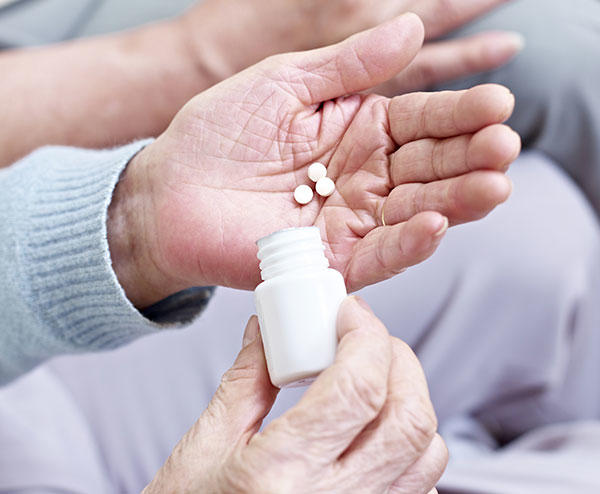Nausea and Vomiting
Nausea is when you feel sick to your stomach, as if you are going to throw up. Vomiting is when you throw up.
What cancer treatments can cause nausea and vomiting?
Nausea and/or vomiting can be side effects of most cancer treatments. For example, surgery, some types of chemotherapy, immunotherapy, targeted therapy, and radiation therapy to certain parts of the body may cause these side effects.
Radiation Therapy Audio Transcript
What To Do About Nausea and Vomiting
Narrator:
What to do about nausea and vomiting during radiation therapy.
Do you have an upset stomach or are you vomiting? Rodney offers tips from his nurse that helped him. Let’s hear what he has to say.
Rodney:
I think there is one thing we can all agree on—vomiting is no good. There were days during radiation therapy that I was just so sick. So, I called my doctor, and he prescribed some medicine that helped a lot.
In addition to getting and taking medicine that helped a lot, my nurse gave me 3 tips. I did these things on days when it was hard to keep food down, and I want to share them with you.
Tip 1: Eat small meals – 5 or 6 small meals stayed down easier for me than 3 big meals.
Tip 2: Try drinks and foods that are easy on the stomach. Clear soft drinks, crackers, and plain toast are easy to digest.
Tip 3: Sit up or go for a short walk after eating.
Try these tips. They worked for me. I hope they can help you prevent nausea and vomiting, too.
Oh, it also helped to have a small snack before treatment. That seemed to work best for me. But one of the guys in the waiting room said that it worked best for him to avoid eating or drinking before treatment. Talk with your doctor to learn what might work best for you.
Narrator Summary:
Feeling sick to your stomach and vomiting can cause you to lose fluids that your body needs. Talk with your doctor or nurse if you are vomiting and cannot keep down fluids. There is medicine that can help. So can following the 3 tips from Rodney’s nurse:
Tip number 1: Eat 5 or 6 small meals a day.
Tip number 2: When you are feeling sick to your stomach, choose drinks and foods that are easy to digest, such as clear soft drinks, crackers, and plain toast.
Tip number 3: It can help to sit up or take a short walk after eating.
Finally, be sure to talk with your doctor or nurse to learn more about how to manage nausea and vomiting.
What are the different types of nausea and vomiting?
The different types of nausea and vomiting caused by cancer treatment, include acute, delayed, and anticipatory nausea and vomiting.
What serious problems can nausea and vomiting cause?
Nausea and vomiting can cause serious health problems such as malnutrition and dehydration. Controlling nausea and vomiting can help to prevent these problems. It can also help you to feel better.
Ways to manage
Your doctor or nurse will work to figure out what is causing your symptoms. Medicines called anti-nausea drugs or antiemetics work well and are effective in preventing or reducing many types of nausea and vomiting. The medicine is taken at specific times to prevent and/or control symptoms of nausea and vomiting.
Here are some practical tips and steps you can take to feel better when you have nausea and vomiting:
- Take an anti-nausea medicine. Talk with your doctor or nurse to learn when to take your medicine. Most people need to take an anti-nausea medicine even on days when they feel well. Tell your doctor or nurse if the medicine doesn’t help. There are different kinds of medicine and one may work better than another for you.
- Drink plenty of water and fluids. Drinking will help to prevent dehydration, a serious problem that happens when your body loses too much fluid and you are not drinking enough. Try to sip on water, fruit juices, ginger ale, tea, and/or sports drinks throughout the day.
- Avoid certain foods. Don’t eat greasy, fried, sweet, or spicy foods if you feel sick after eating them. If the smell of food bothers you, ask others to make your food. Try cold foods that do not have strong smells, or let food cool down before you eat it.
- Try these tips on treatment days. Some people find that it helps to eat a small snack before treatment. Others avoid eating or drinking right before or after treatment because it makes them feel sick. After treatment, wait at least 1 hour before you eat or drink.
- Learn about complementary medicine practices that may help. Acupuncture relieves nausea and/or vomiting cause by chemotherapy in some people. Deep breathing, guided imagery, hypnosis, and other relaxation techniques (such as listening to music, reading a book, or meditating) also help some people.
Talking with your health care team
Prepare for your visit by making a list of questions to ask. Consider adding these questions to your list:
- What symptoms or problems should I call you about?
- What medicine could help me? When should I take this medicine?
- How much liquid should I drink each day? What should I do if I throw up?
- What foods would be easy on my stomach? What foods should I avoid?
- Could I meet with a registered dietitian to learn more?
- What specialists could I see to learn about acupuncture and other practices that could help to lower my symptoms?
![]()
Listen to tips on how to manage nausea and vomiting caused by cancer treatments such as radiation therapy.
(Type: MP3 | Time: 2:18 | Size: 2.2MB)
Radiation Therapy Audio Transcript
What To Do About Nausea and Vomiting
Narrator:
What to do about nausea and vomiting during radiation therapy.
Do you have an upset stomach or are you vomiting? Rodney offers tips from his nurse that helped him. Let’s hear what he has to say.
Rodney:
I think there is one thing we can all agree on—vomiting is no good. There were days during radiation therapy that I was just so sick. So, I called my doctor, and he prescribed some medicine that helped a lot.
In addition to getting and taking medicine that helped a lot, my nurse gave me 3 tips. I did these things on days when it was hard to keep food down, and I want to share them with you.
Tip 1: Eat small meals – 5 or 6 small meals stayed down easier for me than 3 big meals.
Tip 2: Try drinks and foods that are easy on the stomach. Clear soft drinks, crackers, and plain toast are easy to digest.
Tip 3: Sit up or go for a short walk after eating.
Try these tips. They worked for me. I hope they can help you prevent nausea and vomiting, too.
Oh, it also helped to have a small snack before treatment. That seemed to work best for me. But one of the guys in the waiting room said that it worked best for him to avoid eating or drinking before treatment. Talk with your doctor to learn what might work best for you.
Narrator Summary:
Feeling sick to your stomach and vomiting can cause you to lose fluids that your body needs. Talk with your doctor or nurse if you are vomiting and cannot keep down fluids. There is medicine that can help. So can following the 3 tips from Rodney’s nurse:
Tip number 1: Eat 5 or 6 small meals a day.
Tip number 2: When you are feeling sick to your stomach, choose drinks and foods that are easy to digest, such as clear soft drinks, crackers, and plain toast.
Tip number 3: It can help to sit up or take a short walk after eating.
Finally, be sure to talk with your doctor or nurse to learn more about how to manage nausea and vomiting.



